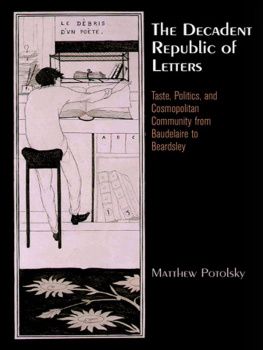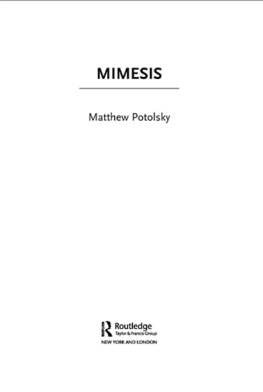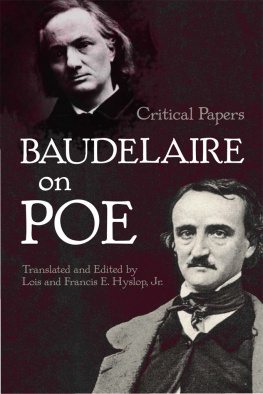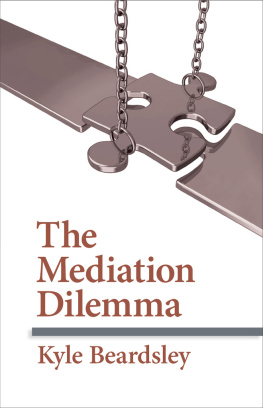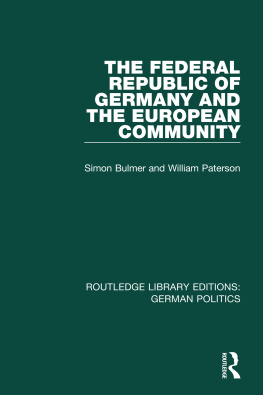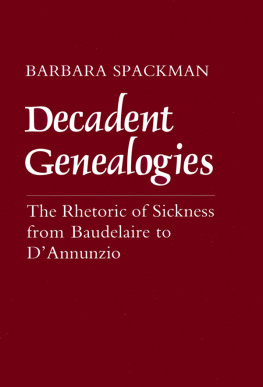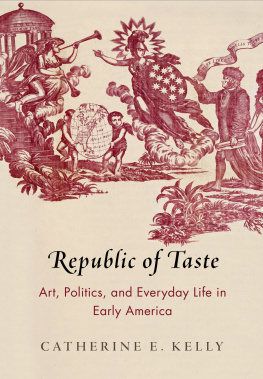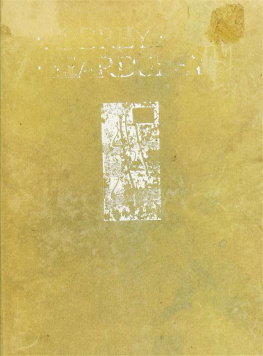
The Decadent Republic of Letters
THE DECADENT REPUBLIC OF LETTERS
Taste, Politics, and Cosmopolitan Community from Baudelaire to Beardsley
Matthew Potolsky

A volume in the Haney Foundation Series, established in 1961 with the generous support of Dr. John Louis Haney.
Copyright 2013 University of Pennsylvania Press
All rights reserved. Except for brief quotations used for purposes of review or scholarly citation, none of this book may be reproduced in any form by any means without written permission from the publisher.
Published by
University of Pennsylvania Press
Philadelphia, Pennsylvania 19104-4112
www.upenn.edu/pennpress
Printed in the United States of America on acid-free paper
10 9 8 7 6 5 4 3 2 1
Library of Congress Cataloging-in-Publication Data
Potolsky, Matthew.
The decadent republic of letters : taste, politics, and cosmopolitan community from Baudelaire to Beardsley / Matthew Potolsky. 1st ed.
p. cm. (Haney Foundation series)
Includes bibliographical references and index.
ISBN 978-0-8122-4449-6 (hardcover : alk. paper)
1. Decadence (Literary movement)England. 2. Decadence (Literary movement)France. 3. English literature19th centuryHistory and criticism. 4. French literature19th centuryHistory and criticism. 5. Literature and societyEnglandHistory19th century. 6. Literature and societyFrance History19th century. I. Title. II. Series: Haney Foundation series.
PN56.D45P67 2013
809'.034dc23
2012014203
To my family
CONTENTS
___________
INTRODUCTION
___________
Workers of the Final Hour
Community is made of what retreats from it.
Jean-Luc Nancy, The Inoperative Community
With surprisingly few exceptions, the history of the decadent movement has been told from the perspective of a single national traditionwith due acknowledgment of the French (most often), English, American, or German origin of this or that key figure or contributing intellectual thread. Written as part of a growing interest among scholars in cosmopolitanism, internationalism, and cross-Channel and transatlantic connections, The Decadent Republic of Letters regards decadence as fundamentally international in origin and orientation. The various names artists and critics have applied to fin-de-sicle literary movements tend to be identified with a single national tradition. Aestheticism was largely a British movement; Symbolism developed in France. Decadence, by contrast, was an international movement from the beginning, and had a lasting impact around the world well after the turn of the century. This book focuses chiefly on French and English writers of the second half of the nineteenth century, but the stylistic and thematic paradigms I tease out of the movement were adapted by writers from the United States, Latin America, Central Europe, and other regions. Defined by more than the familiar set of images, themes, and stylistic traits normally associated with the movement, decadence, as I present it here, is a characteristic mode of reception, a stance that writers take in relationship to their culture and to the cosmopolitan traditions that influence them.
This stance originates in a transatlantic encounter: Charles Baudelaires translations of and critical writings on Edgar Allan Poe. These texts provided Essentially internationalist, decadent writing is a form of cultural production that begins with and recurrently thematizes the act of literary and artistic border crossing.
The radically syncretic and cosmopolitan texture of decadent writing accounts for the difficulty scholars have long had in defining the movement, or even fixing its major adherents. In his pioneering study of the fin de sicle, The Eighteen Nineties (1913), Holbrook Jackson identifies four characteristic elements of decadent writing: perversity, artificiality, egoism, and curiosity.
Etymologically, decadence means to fall down or from (from the Latin de + cadere ). It describes a temporal contrast or comparison. A body, a society, or an artistic form falls away from something prior and better: health, virtue, tradition, and so forth. Eighteenth-century historians such as the baron de Montesquieu and Edward Gibbon adapted this definition to explain the fall of the Roman Empire. In 1834, the French academic critic Dsir Nisard applied the term to literature in his influential study tudes de moeurs et de critique sur les potes latins de la dcadence , arguing that French Romanticism marks a decline of artistic value from the age of Louis XIV, much as the discredited corpus of decadent Silver Age Latin poetry marked a decline from the artistic and political unity of the early empire.
The writers I discuss in this book use the word decadence and its familiar associations in a wide range of contexts and toward a variety of ends; more often than not, they regard it with Gautiers and Baudelaires revisionary eye, transforming a term of opprobrium into a means of self-defense or
I argue in this book, by contrast, that decadence is a consciously adopted and freely adapted literary stance, a characteristic mode of reception, rather than a discernible quality of things or people. It is a form of judgment and a way of doing things with texts. As Richard Le Gallienne perceptively put it in an article from 1892, decadence lies not in a particular theme or style but in the character of the treatment. Decadent writers sort incessantly through the materials of the cultural past, defining their relationship to others in the movement by collecting disparate themes, tropes, and stylistic manners from around the globe and binding them together according to their peculiar tastes and proclivities. Foregrounding acts of selection, juxtaposition, and critical discernment, they piece together ostentatiously borrowed parts, rather than purporting to create in any traditional sense or according to a clearly delineated doctrine. Reception is for these writers a crucial means of production.
Because it never adumbrated a single, unified doctrine, decadence attracted writers of strikingly various interests and talents, many of whom took up the stance for a time and later moved on to other forms, and even repudiated the movement altogether. The relationship of decadent writers to each another is closer to what Ludwig Wittgenstein calls a family resemblance, which is marked by a complicated network of similarities overlapping and criss-crossing, than to the overriding unity of purpose that characterizes (at least ideally) a traditional literary group.
Regarding decadence as an evolving literary stance rather than a fixed set of traits brings into focus a mostly unrecognized vision of cosmopolitan community that pervades the movement. Critics have long argued that the key characteristic of decadent writing is a turn away from the world and the public interest to the interiority of the private self. True to the etymology of the term, decadence deviates from or rejects some norm. It is nihilistic, condemnatory, and destructive, a perverse mirror of the bourgeois individualism it claims to abhor. In his essay on Baudelaire, Bourget describes decadent societies as organisms in which the cells no longer work together in the interest of the whole; such societies produce too few individuals suited to the labors of communal life. Decadent style exemplifies this social atomization: A style of decadence is one in which the unity of the book is decomposed to make way for the independence of the page, the page is decomposed to make way for the independence of the sentence, and the sentence makes way for the independence of the word. Most famously exemplified by Wildes epigrammatic deconstructions of received wisdom, decadent opposition here becomes strategic, an overturning of bourgeois ideology through parody, paradox, and subversive appropriation. The decadent, however, is still a nihilistic outsider who rejects social belonging out of disgust with the bourgeoisie.
Next page
